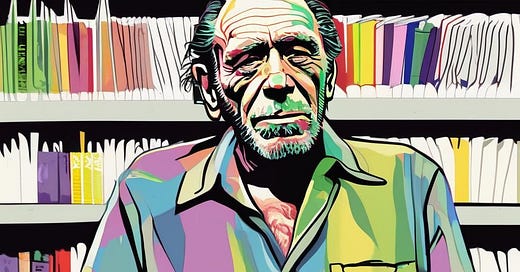“People are strange: They are constantly angered by trivial things, but on a major matter like totally wasting their lives, they hardly seem to notice.”
That’s Charles Bukowski. The Bard of Booze. Legendary drunk, cult favorite, the darling of the L.A. literary underground.
His true-life stories fueled Barfly (1987), which features Mickey Rourke as Henry Chinaski, Bukowski’s main literary protagonist and real-life mirror. I found it unwatchable, but the film enjoys a 7.1 rating on IMDB and gave Bukowski financial security for the first time in his life at age 67, after a lifetime of writing (and writing and writing and drinking and drinking).
Bukowski was a writer. He worked at the post office and at menial jobs to survive, but he wrote to live. He eventually gave up his jobs, saying he could keep doing them and go crazy or “play at writer and starve.” He decided to starve, writing for low-paying L.A. alternative newspapers, like Open City and the Los Angeles Free Press.
A sympathetic publisher, Black Sparrow Press, gave him a small monthly stipend so he wouldn’t starve, and he started cranking out novels that eventually attracted a cult following. His first came out in 1971: Post Office. They say it’s essential reading, along with his Factotum and Women.
They say his boyhood made Oliver Twist’s look pampered. He had terrible acne (it was so bad that the doctor wrapped his face in gauze). The acne scarred his face permanently. His father was abusive. I guess it’s not surprising that he drank.
And have no doubt: Bukowski was no cocktail poseur. He was a drunk. Dispositive proof: He loved Schlitz . . . and pretty much every other drink, especially whiskey.
Perhaps his biggest claim to fame: He made it to the finals of Modern Drunkard Magazine’s inaugural “Clash of the Tightest,” where he lost to one of the greatest drunks of the twentieth century, Jackie Gleason, in an epic 29-round slam fest.
He survived to age 74, which is shocking, given his liquid diet. When he started to die, he kept drinking and writing, saying, “If I die, I hope to go with my head on that typewriter. It’s my battlefield.”
Heroes come in different forms, I suppose, especially these days when pretty much everyone is called a "hero." I suppose we can have reprobate heroes.
A few quotes by The Bard of Booze
“When you drank, the world was still out there, but for the moment it didn’t have you by the throat.”
“I don’t hate people. I just feel better when they’re not around.”
“That’s the problem with drinking, I thought, as I poured myself a drink. If something bad happens you drink in an attempt to forget; if something good happens you drink in order to celebrate; and if nothing happens you drink to make something happen.”
“When you clean up a city you kill it.”
"My readers are the defeated, the demented and the damned — and I am proud of it.”




